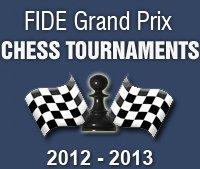
How Popular Is Chess?
AGON, the company set up to organise and promote the commercial activities of the World Chess Championship competition cycle, have issued a press release with the results of a survey about chess.
The survey was conducted by the polling organisation YouGov, and the results should help inform Agon's attempts to "re-brand" the world chess championship and "professionalise and enliven" the game around the world.
So, with the right organisation and branding can chess be a more lucrative, high-profile and successful sport? Or is chess a niche interest that will never have more widespread appeal?
The press release is included in its entirety below, with accompanying notes and survey methodology.
Chess Redux
AGON releases new chess player statistics from YouGov
Chess has been under the radar for the last 40 years since Bobby Fischer and Boris Spassky fought the Cold War for us in Reykjavik. But outside the glare of the media spotlight chess players now make up one of the largest communities in the world: 605 million adults play chess regularly -- a number comparable to regular users of Facebook.
According to authoritative polling organization YouGov, across varied national demographic profiles (US, UK, Germany, Russia, India), a surprisingly stable 70% of the adult population has played chess at some point during their lives. Even if they played as children but left it behind as they grew up, they still retain a deep admiration for the game.
Across the board, chess players and non-players alike rank chess significantly higher than any other game or sport for attributes such as intelligence, sophistication, strategy, perfection and complexity confirming top branding agency Pentagram’s view: “Chess is about Thinking and Winning.”
Most surprising is the percentage of adults who actually currently play chess (either weekly, monthly or during the past year): 12% in the UK; 15% in the U.S. 23% in Germany; 43% in Russia; and 70% among the 121m Indians considered ABC1 by advertisers.
From The Wire and The West Wing to Harry Potter and Guy Ritchie’s Revolver, chess remains ubiquitous in popular culture as a metaphor for conflict and power. Further, in the real world, last month when Enrique Peña became the new president of Mexico, the NYT attributed his success to “the same attention to strategy he applieswhile playing chess.” And, when US trader Boaz Weinstein cleaned up after JPMorgan lost $1.8bn, the NYT explained it: “He is a chess master.”
But the raw numbers themselves are astonishing: over 6m, 35m, 16m, 50m and 85m people in the U.K., U.S., Germany, Russia, and India (ABC1), respectively, are playing chess regularly and more than half are 18-34.
And, when YouGov dug deeper, they found out how people who play chess regularly differ from those who don’t.
Current chess players are better informed than those who either used to or never played chess: they are 5x more likely to read The Guardian, The New Scientist or The Week (in the U.K.) or 2.5x more likely to read The New York Times, The Wall Street Journal, The Economist or The New Yorker (in the U.S.).
Although chess has very low barriers to entry and is played across the socioeconomic spectrum, in the U.S. 78% of regular chess players are university graduates and among households with incomes over $120,000, 21% are regular chess-players.
Despite their popular image as reclusive ascetics, chess players consume immoderately: in categories traditionally used to measure affluence (cars, watches, air travel, branded alcohol consumption, online purchasing), global research organization TGI (WPP) reports that chess players are 40-100% more likely to purchase a luxury item than a non-chess-player.
These findings from YouGov and TGI were commissioned by AGON, the commercial enterprise that was accorded the rights to the World Chess Championship Cycle earlier this year by the World Chess Federation (FIDE).
Entrepreneur Andrew Paulson, founder of AGON, said: “In an official International Olympics Committee (IOC) submission a few years ago, FIDE cited the number of chess players worldwide to be 605 million. I wanted to know if this was true and who and where they were. I was happily surprised; the results far exceeded our expectations.”
They confirm the premise from Steve Martin, CEO of M&C Saatchi Sports, that chess is the “sleeping giant” of the sports/entertainment world, adding that “It’s rare to get something so untainted by previous branding,” he said.
.
Notes for editors:
AGON, founded by London-based entrepreneur Andrew Paulson, has been granted the long-term, exclusive rights to organize and commercialize the World Chess Championship Cycle by FIDE, the Fédération Internationale des Échecs.
AGON will restore World Chess’ high profile in traditional print and broadcast media, consolidate a global audience with more accessible online and mobile products, curate gripping live events, and bring together government and business partners in a rarified atmosphere. AGON also actively supports local, municipal initiatives, especially the Chess in Schools Movement, opening up competition venues to 200 youngsters every day of play for competition and instruction.
Cycle: The World Chess Championship Cycle is comprised of nine events over two years culminating in a Championship Match. In 2013, over 100 days of games will be held in prestigious venues in world cities (LONDON LISBON MADRID PARIS BERLIN ISTANBUL) with players representing 15 countries (RUSSIA CHINA INDIA U.S. NORWAY ITALY ISRAEL UKRAINE HOLLAND HUNGARY ARMENIA AZERBAIJAN UZBEKISTAN BULGARIA CUBA). The 2013 Prize Fund is €5.5m. In 2014, the Cycle will move to North and South America.
Audience: Chess is regularly played by a demographic that is the holy grail of sponsors (AFFLUENT YOUNG EDUCATED MEN INFORMED CONNECTED ACTIVE) and is attributed rare and admirable qualities by 70% of the population, most of whom first played as children (INTELLIGENCE STRATEGY DECISIVENESS SOPHISTICATION PERFECTION). (Source: YouGov 2012) In the U.S., more people play chess than tennis and golf, combined!
Games: The games will be held in a purpose-built ‘cockpit’ (created by Pentagram Design) before an intimate live audience and broadcast in various formats to the public via cable, online and mobile platforms. ChessCasting, a new application developed by the former Director of Interactive Design at the BBC, Vibeke Hansen, will transform chess into a spectator sport: the live and remote audience will be able to understand games through the eyes of a grandmaster and approximate the emotions of the players themselves. A true hybrid of game and sport, the audience will be able to watch and play at the same time.
Social Media: Chess is not a ‘casual’ game. Unlike other sports, chess content remains vital and engaging long after a game is over and the results are known. As with many hobbies, chess enthusiasts make significant investment of time and energy without expectation of compensation, except in kind. Technology has transformed chess over the last 30 years but has not yet tapped into its huge social potential; as soon as it is easier and more exciting to play with friends than against a computer or a mobile phone, this audience will engage and could become one of the largest groups in social media.
Corporate Social Responsibility: Unlike other games, chess has an educational value recognized by governments (in dozens of countries, including the European Union) to improve test scores and fight against Attention Deficit Disorder, and is now commonly included in school curricula. During the World Chess Championship Cycle, two hundred children will be invited to participate in tournaments and instruction each morning before the competitions begin.
Events: The World Chess Championship Cycle will bring together municipal and national government, the diplomatic corps, global brand partners and local corporate representatives.
Sponsorship: AGON will collaborate with brand partners from diverse sectors -- but with similar reach, values and aspirations -- to make this a sustainable business. Sponsors will derive value not just from association with those who play chess (12- 15%), but also with those who have played and continue to attribute to chess such rare and admirable qualities (70%).
.
Survey methodology:
The US survey was conducted using an online interview administered to members of the YouGov Plc US panel of over 1,000,000 individuals who have agreed to take part in surveys. An email is sent to panelists selected at random from the base sample according to the sample definition, inviting them to take part in the survey and providing a link to the survey. [The sample definition could be “US adult population” or a subset such as “US adult females”]. YouGov Plc normally achieves a response rate of between 35% and 50% to surveys, however this does vary dependent upon the subject matter, complexity and length of the questionnaire.
The responding sample is weighted to the profile of the sample definition to provide a representative reporting sample. The profile is normally derived from census data or, if not available from the census, from industry accepted data.
The UK survey was conducted using an online interview administered to members of the YouGov Plc GB panel of 350,000+ individuals who have agreed to take part in surveys. An email is sent to panelists selected at random from the base sample according to the sample definition, inviting them to take part in the survey and providing a link to the survey. [The sample definition could be “GB adult population” or a subset such as “GB adult females”]. YouGov Plc normally achieves a response rate of between 35% and 50% to surveys, however this does vary dependent upon the subject matter, complexity and length of the questionnaire.
The responding sample is weighted to the profile of the sample definition to provide a representative reporting sample. The profile is normally derived from census data or, if not available from the census, from industry accepted data.
The methodology for the UK, Germany, Russia and India surveys was the same as for the US, conducted using online interviews administered to members of the YouGov Plc UK panel of 350,000+ individuals who have agreed to take part in surveys, the YouGov Plc German panel of 120,000+ individuals, the YouGov Plc Russian panel of 77,000 individuals, and the YouGov Plc Indian panel of 8,000+ individuals.
NB: All figures, unless otherwise stated in the footnotes, are from YouGov Plc. Total sample sizes were 4,161 adults (UK), 2,024 adults (US), 953 adults (Germany), 2,013 adults (Russia), and 1,000 adults (India). Fieldwork was carried out between 16 to 18 May (US), 30 March to 02 April (UK), 02 July to 06 July (Germany), 09 to 23 July (Russia), and 03 to 12 July (India). All surveys were carried out online. All sets of figures for the UK, US, Germany and Russia have been weighted and are representative of each country’s adults (aged 18+). The figures for India are representative of the online Indian adult population.
For more information (including access to the raw YouGov survey results), please contact:
Harriet Dennys Mission PR
Tel: 0207 8457800
Mob: 07979 692018
Email: harrietd@thisismission.com
